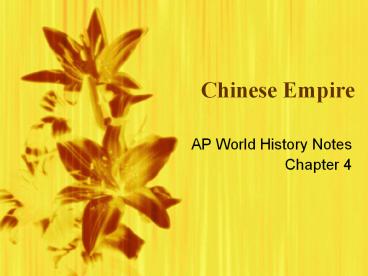Chinese Empire - PowerPoint PPT Presentation
1 / 25
Title:
Chinese Empire
Description:
Title: China s Flourishing Civilization Author: Elise Cona Last modified by: GSCS Created Date: 1/1/1970 12:07:38 AM Document presentation format – PowerPoint PPT presentation
Number of Views:116
Avg rating:3.0/5.0
Title: Chinese Empire
1
Chinese Empire
- AP World History Notes
- Chapter 4
2
- From 1100 BCE until the 200s CE --gt 3 great
dynasties ruled China - Zhou (JOH)
- Qin (CHIN)
- Han (HAHN)
3
The Enduring Zhou
- Ruled China for more than 800 years -- more than
any other dynasty - Zhou dynasty conquered the Shang dynasty
- Claimed rule under Mandate of Heaven
- Said Shang lost mandate by ruling poorly
4
The Enduring Zhou
- To control their land, the kings set up an
agricultural system in which nobles owned the
land peasants worked it - Kings gave their relatives city-states
- Each of these lords had total authority over
their city had their own armies - Eventually, the lords had more power than the
king - City-states warred with each other -- locked in a
struggle that ended the Zhou era
5
The Enduring Zhou
- Technological advances of the Zhou Dynasty
- Built roads expanded foreign trade
- Formed cavalries groups of warriors on
horseback - New weapon the crossbow
- Iron plows
- Irrigation flood-control systems
6
The Enduring Zhou
- Chinas population grew quickly during the Zhou
Dynasty
7
The Mighty Qin
- Conquered the Zhou
- First Emperor Qin Shihuangdi
8
The First Emperor
- United much of the nation under 1 strong
government - Organized the empire into military districts -- 1
official per district - Created a universal system of weights measures
- Standardized coins, created a uniform writing
system set up a law code throughout China - Used forced labor to dig canals build roads
9
Terra Cotta Army
10
Terra Cotta Army
11
The Great Wall of China
- Built in northern China to prevent attacks from
the north - Connected a series of walls that already existed
- Took several years over 300,000 Chinese
peasants --gt thousands died - Stretches over 4,000 miles
12
The Great Wall of China
13
The Great Wall of China
14
Qins Strict Rule
- Imposed a tax on landowners
- Appointed only educated men as officials to run
his government - Censored burned books
- People couldnt write about the past
15
Legalism
- Legalists scholars that opposed Confucian ideas
- Legalism philosophy that rejected Confucian
idea of learning by example and emphasized strict
laws and harsh punishments
16
Qins Strict Rule
- Subjects saw Qin as a cruel tyrant
- Nobles mad he destroyed aristocracy
- Peasants mad about the forced labor
- Scholars mad about book burning
210 BCE Qin died dynasty soon came to an
end Lasting Legacy new ways of organizing
unifying the nation
17
The Glorious Han
- Ruled China for more than 400 years until 220 AD
- Used same forms of centralized power as the Qin,
but not as harsh - Rivaled Roman Empire in its power achievement
18
The Glorious Han
- Reached its peak during the reign of King Wudi
- Extended the empire
- Sent armies against nomadic invaders
- Interested in the West -- especially the Roman
Empire
19
The Glorious Han
- Trade routes to the West developed
- Major trade route Silk Road
- Linked East West
- Allowed traders to exchange Chinese silk for
Middle Eastern European products
20
The Silk Road
21
Pax Sinica
- Chinese Peace 400 year period of prosperity
stability - China fed its population by storing grain during
times of plenty selling it when harvests were
poor
22
Advancements in Farming Transport
- Veterinary medicine
- Complex irrigation systems
- Advancements in fertilizing crops
- New canals
- Better roadways
23
Inventions
- Silk
- Paper
- Gunpowder
- Wheelbarrow
- Printed books
- Suspension bridge
- Compass
- Iron drill bits
24
Pax Sinica
- Talented, intelligent people were appointed to
government jobs -- NOT family - They were given tests to see if they were
qualified - Evolved into civil service system a system that
allowed anyone with ability to attain public
office --gt unfortunately, this usually favored
the wealthy because education was expensive - Created a new class of well-educated civil
servants called mandarins - Controlled government until early 1900s
25
Pax Sinica
- Han power declined dynasty fell apart after
Wudis reign ended




























![[PDF READ ONLINE] At the Edge of Empire: A Family's Reckoning with China PowerPoint PPT Presentation](https://s3.amazonaws.com/images.powershow.com/10107604.th0.jpg?_=20240824109)
![[PDF READ ONLINE] At the Edge of Empire: A Family's Reckoning with China PowerPoint PPT Presentation](https://s3.amazonaws.com/images.powershow.com/10108943.th0.jpg?_=202408250610)

![[PDF READ ONLINE] At the Edge of Empire: A Family's Reckoning with China PowerPoint PPT Presentation](https://s3.amazonaws.com/images.powershow.com/10134767.th0.jpg?_=202409210212)